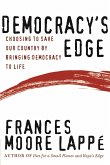Democracy has been a flawed hegemon since the fall of communism. Its flexibility, its commitment to equality of representation, and its recognition of the legitimacy of opposition politics, are all positive features for political institutions. But democracy has many deficiencies: it is all too easily held hostage by powerful interests; it often fails to advance social justice; and it does not cope well with a number of features of the political landscape, such as political identities, boundary disputes, and environmental crises. Although democracy is valuable it fits uneasily with many other political values and is in many respects less than equal to the demands it confronts. In this volume (and its companion, Democracy's Value) some of the world's most prominent political theorists and social scientists present original discussions of these urgently vexing subjects. Democracy's Edges analyses an enduring problem: how to establish the boundaries of democratic polities democratical
Hinweis: Dieser Artikel kann nur an eine deutsche Lieferadresse ausgeliefert werden.
Hinweis: Dieser Artikel kann nur an eine deutsche Lieferadresse ausgeliefert werden.
'In a world where the boundaries of nation-states are criss-crossed by vast movements of people, capital, cultures and ideas and increasingly contested from within and without, questions about the scope of democracy should be at the forefront of democratic theory. This volume will ensure that they are. The contributors are amongst the leading thinkers in the field and their papers address the nature and scope of democracy in fresh and insightful ways in light of current developments in world politics. Topical, timely and well-organized, this volume is a must for democratic theorists everywhere.' Duncan Ivison, University of Sydney








